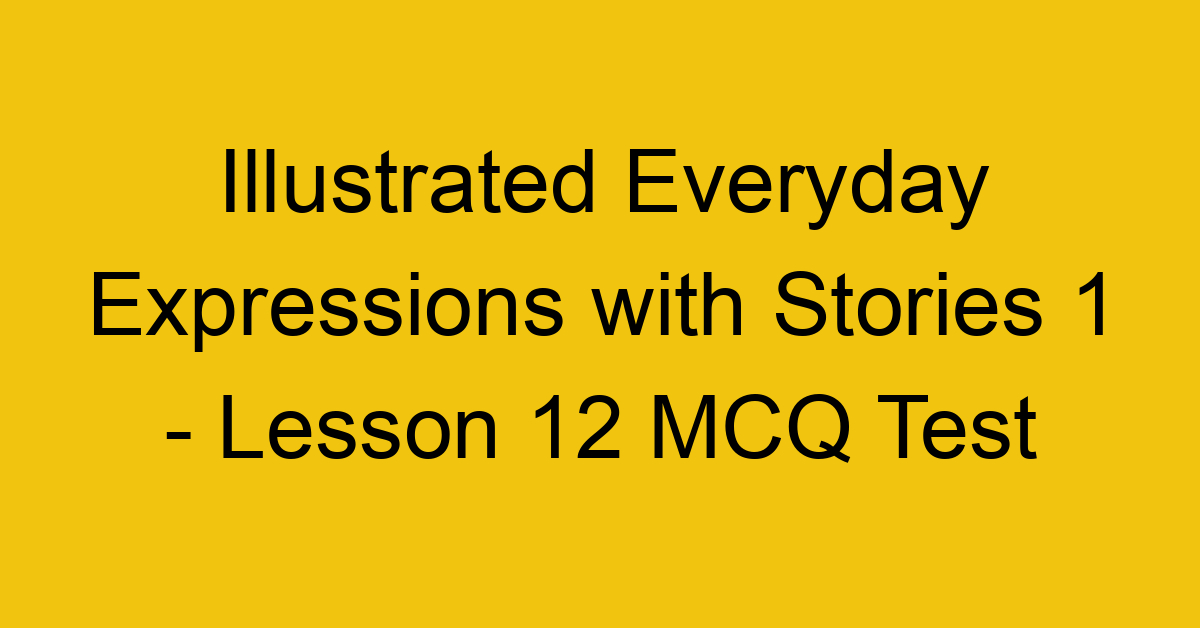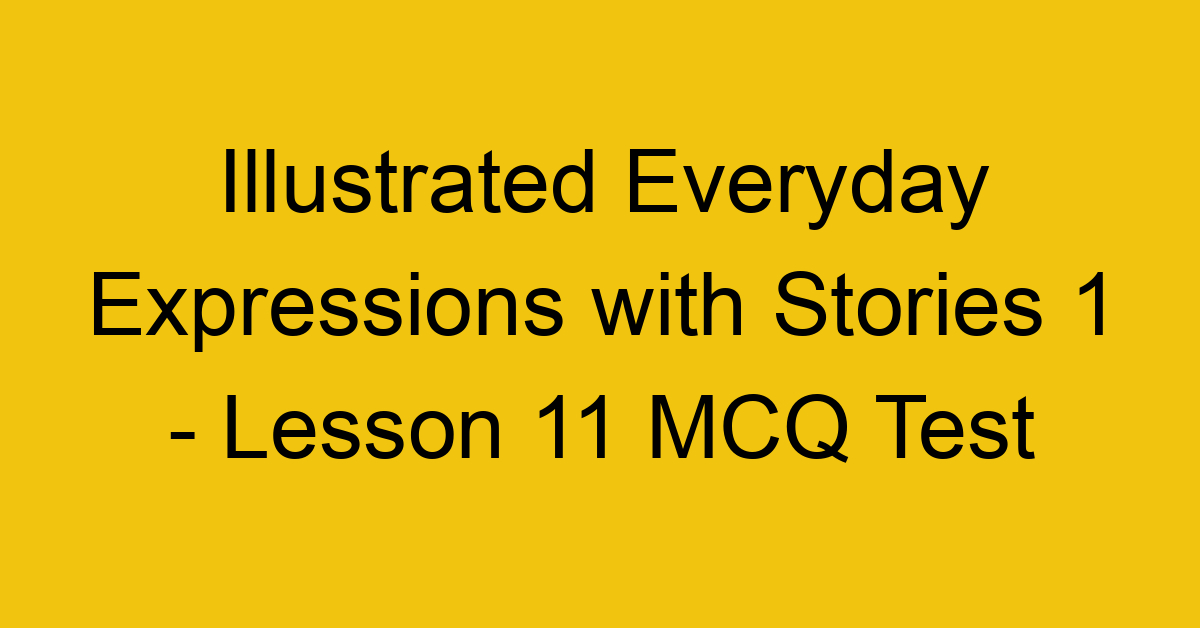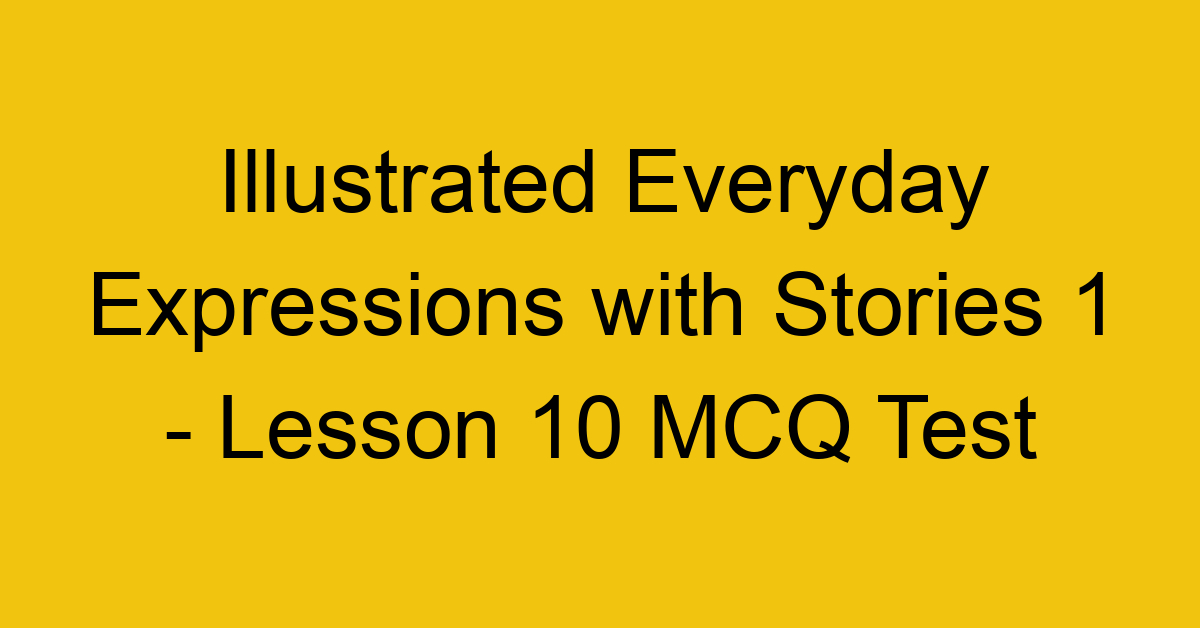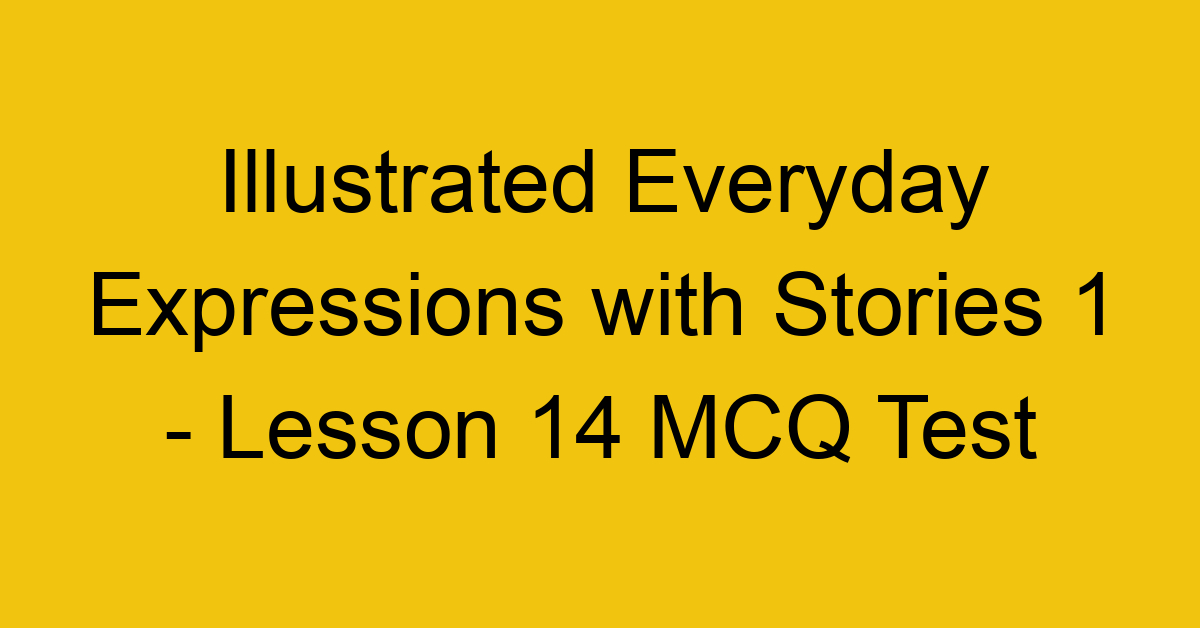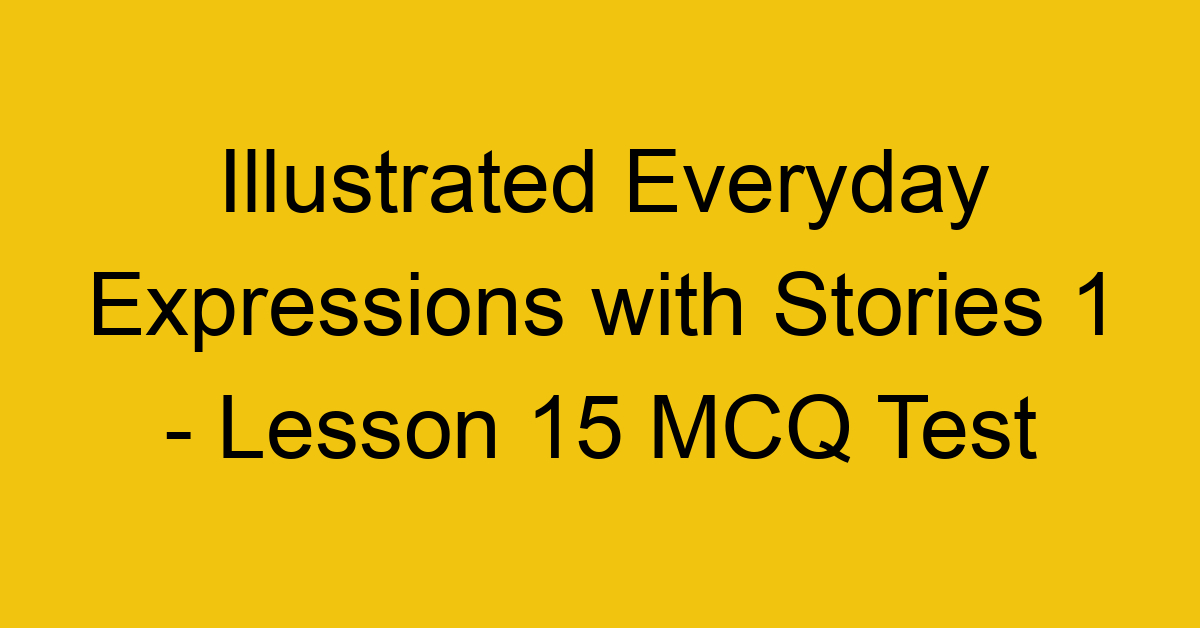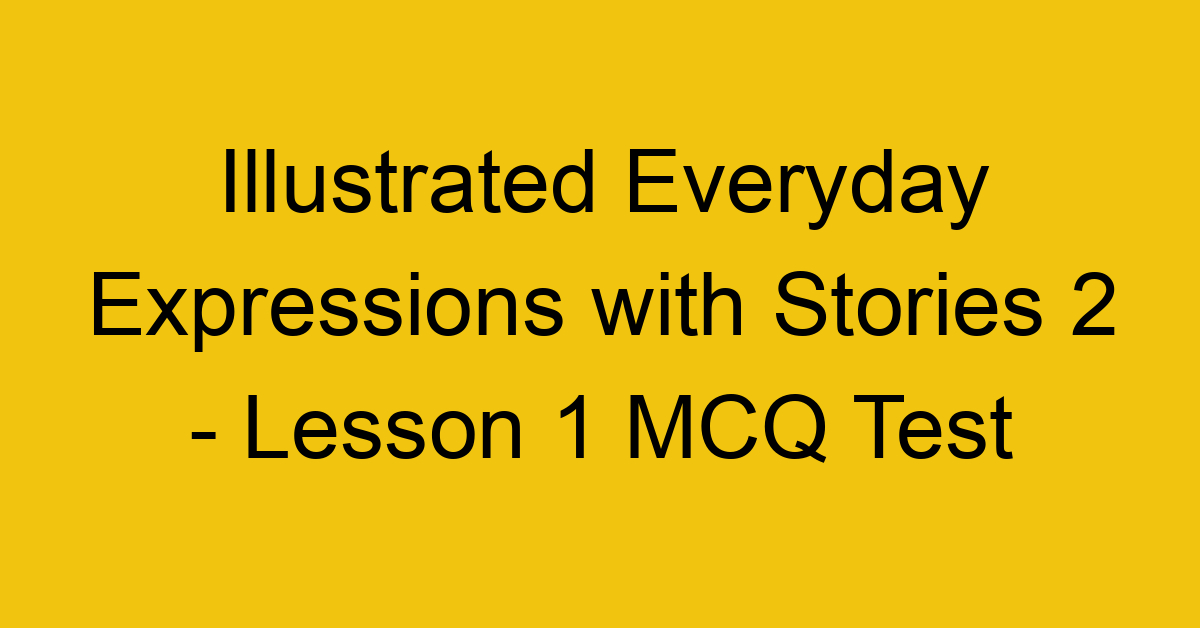Illustrated Everyday Expressions with Stories 1 - Lesson 13 MCQ Test
Lesson 13 – The Kalligooroo
Idioms
protect A from B = shield A from B
A good coat can protect you from the cold.
The helmet protected his head from injury in the crash.
Our dog protects our home from robbers.
A: Why do you put a fence around your flowers?
B: It protects them from hungry rabbits.
prove to be = turn out to be
He proved to be the strongest.
The man proved to be criminal.
She proved to be an unfaithful friend.
A: Why was the man let out of jail?
B: The fingerprints on the gun proved to be someone else’s.
put down = set something on a surface
Put down the wire!
When he finished the letter, he put down his pencil.
The bag was too heavy, so I put it down.
A: Where do you want this box?
B: Just put it down by the door, thanks.
put off = delay; postpone; defer
He put off washing his shirt for too long!
Don’t put off doing your homework.
You should not put it off until tomorrow.
A: Do you like cleaning your room?
B: No. I put it off as long as possible.
put on = get dressed in; wear; have on
He put on his helmet before the game started.
The girl put on her glasses to read.
She put on her swimming suit.
A: Let’s go for a walk.
B: OK. Let me put on my shoes.
put together = join parts together; assemble
He put together a house of cards.
The boy put together a model airplane.
Let’s put together that puzzle.
A: I think we should put together a ski club.
B: Good idea. I’ll ask my friends at work.
put up with = suffer without complaining; stand; tolerate
I can’t put up with cockroaches.
She likes cats, but can’t put up with their hair.
He refuses to put up with people who smoke in the bathroom.
A: Ha-Ha! You’re stupid. You can’t do math!
B: Stop it! I can’t put up with your teasing me anymore.
quite a few = many; not a few; a number of; a lot of
There are quite a few fish in group.
There were quite a few people at the park.
There are quite a few good movies at the cinema.
A: About fifty people went to Kim’s birthday party.
B: Wow! That’s quite a few people!
remind A of B = make A think of B; be reminiscent of; evoke
He reminds me of his father.
The picture reminds him of home.
She reminds me of a movie star.
A: Why does this song remind you of your grandfather?
B: Because it was his favorite song.
remove A from B = get rid of; take away from
She wanted to remove the lock from the door.
I removed his name from the list.
He removed the ring from his finger.
A: Whose shoes are those?
B: They’re mine. I’ll remove them from the room.
result from = be caused by; arise from
A big stomach can result from eating too much.
The flood resulted from too much rain.
The fire resulted from a cigarette in the garbage can.
A: Why did you do poorly on the test?
B: It resulted from my not studying last night.
right away = immediately; without delay; at once; right now
He needs help right away.
She has to go to hospital right away!
Stay there! I am coming right away!
A: Can you stay for a few more minutes?
B: Sorry. I have to leave right away.
run across = find or meet by chance; come across; encounter; discover
He was surprised to run across the old record in his friend’s collection.
She ran across her old boyfriend at the store.
If you run across that file, please let me know.
A: When did you find this great article?
B: I ran across it in yesterday’s newspaper.
run after = chase; follow
The monster ran after the boy.
The kids ran after the ice cream truck.
The cat ran after the dog!
A: Why is the police officer running after that man?
B: Because he stole that woman’s purse.
run away = leave a place quickly; escape
They had to run away.
He ran away from the bear.
The boy ran away from home.
A: Do you have any pets?
B: I had a puppy, but it ran away two weeks ago.
run out of = use up; finish; exhaust
We’ve run out of water.
Oh no! The store ran out of bread!
I ran out of money at the casino.
A: Why did the car stop?
B: Because we just ran out of gas!
see off = say goodbye to
He came to see his friend off on his journey.
We went to see my sister off at the airport.
Can I come and see you off?
A: I’m leaving for China tomorrow morning.
B: Okay. I’ll be there at the airport to see you off.
set up = build; put up
They set up the bowling pins.
He set up a hot dog stand at the fair.
The campers set up their tent.
A: Have you used the new computer that you got last week?
B: No, Ihaven’t. It’s still in the box because I don’t know how to set it up!
shake hands with = hold someone’s hand and move it up and down as a greeting
They are shaking hands with each other.
The president shook hands with the prime minister.
I had the chance to shake hands with the movie star!
A: Do American people bow when they meet each other for the first time?
B: No they don’t. They shake hands with each other.
show off = show proudly; display proudly
She wanted to show off her expensive coat.
He showed off his new shoes at school.
The girl showed off her report card to her brother.
A: Look! I got an A on my test!
B: Stop showing off!
THE KALLIGOOROO
This is an Australian Aboriginal story that tells how death came into the world. Long ago, there was a time called Dreamtime. There was a long piece of painted wood, called a kalligooroo, set up as a bridge between the earth and the sky. In Dreamtime, people never died. They could go across this bridge whenever they wanted. In both places there was plenty to eat, so no one ever ran out of food.
Every day, quite a few people crossed the kalligooroo. It was common to run across an old friend. These friends might shake hands with each other and talk for a few minutes before going on their way. If someone wanted to go across, it was not necessary to say good-bye and see him or her off. Because no one ever died, they knew that they would meet again across the kalligooroo.
One day, a woman found gold by the river. She wanted to show off her gold to her friends in the sky. It was getting dark, but she wanted to leave right away. She was so excited, she could not put off the trip. She put on her traveling skirt and then put together a bag of things she would need. She took a little food, some water, and a few sticks that she could use to make a fire for cooking.
As the woman walked across the kalligooroo, night came. The woman was afraid that people would run after her and try to take the gold. She could not put up with the idea of someone else having her gold. Then the woman remembered the sticks. A fire would protect her from thieves! The woman removed the sticks from her bag. She put them down in the middle of the kalligooroo and started a small fire. This proved to be a big mistake. The fire burned a large part of the kalligooroo! Now it was impossible for anyone to go across.
The woman ran away. However, someone saw her. Soon everyone knew that the woman had burned the kalligooroo, and no one could ever go to live in the sky again. Those people who were already in the sky could never come back to live on the earth again.
When the woman looked up at the part of the kalligooroo still in the sky at night, those people stuck in the sky were very angry. They were reminded of the woman and what resulted from her foolish behavior. They sent death to kill the woman. So all women were told never to look up at the sky at night or they might see the kalligooroo and die.

